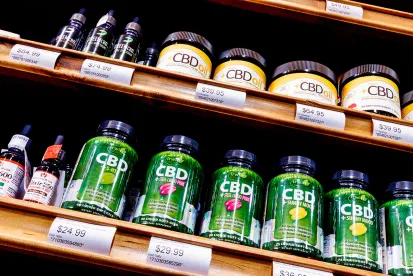OVERVIEW
The Federal Trade Commission (FTC) announced its Health Products Compliance Guidance on December 20, 2022. The 2022 guidance updates and replaces the FTC’s 1998 guidance, Dietary Supplements: An Advertising Guide for Industry. The scope of the new guidance is expanded to cover essentially all health-related product advertising. The guidance also discusses in greater detail the amount and type of evidence required to substantiate health-related product claims through illustrative examples, and clarifies the interrelationship between the FTC and the US Food and Drug Administration (FDA) as it applies to health-related product promotion.
IN DEPTH
While the substantiation requirements remain essentially unchanged, the 2022 guidance memorializes decades of case law and enforcement actions applicable to “any health-related product,” such as foods, over-the-counter drugs, devices and homeopathic products. Since the 1998 guidance issued, marketing techniques, consumer sophistication and health concerns have significantly transformed, requiring FTC to consider novel issues. The 2022 guidance reflects these changes and provides greater insight into current practices that may be considered deceptive advertising.
Key Takeaways and Concepts
Clear and Conspicuous Disclosure Standard
The FTC requires companies to disclose all material qualifying information so that consumers can make informed decisions based on the advertisements. The 2022 guidance underscores the importance of “clear and conspicuous” qualifiers and disclosures. The “ultimate test” of an effective disclosure, according to the FTC, is “the net impression that consumers take from an ad with the disclosure.” If a significant minority of consumers are misled, then the disclosure is likely not sufficient. This is a difficult standard to meet, especially for complex concepts and claims based on limited or emerging science, but the advertiser is responsible for ensuring that consumers understand the extent of the scientific support and the existence of contrary evidence. For example, vague qualifiers and modifiers such as “helps” achieve the claimed benefit, “may” have the claimed benefit, “promising” and “preliminary” are likely inadequate under this standard.
Competent and Reliable Scientific Evidence Standard
In the 2022 guidance, the FTC emphasizes that the amount and type of substantiation required for product claims depends on a variety of factors, such as the type of claim, type of product, feasibility of substantiating the claim, consequences of a false claim, and what experts in the field view as reasonable. FTC suggests that health-related claims must be substantiated by “competent and reliable scientific evidence” in the form of “randomized, controlled human clinical testing” (RCTs). The research quality is more important than the quantity. Notably, there is no set number of RCTs that must be performed to meet the standard. Animal studies, in vitro studies, epidemiological or observational studies, anecdotal evidence, and public health recommendations and advisories are not generally considered to be competent and reliable scientific evidence. However, epidemiological or observational studies may substantiate a claim if they are “considered an acceptable substitute for RCTs by experts in the field” and “RCTs aren’t otherwise feasible.”
Quality of the Evidence
The 2022 guidance expands upon factors the FTC considers when assessing the quality of research for substantiating claims. Advertisers must ensure that the claim language accurately reflects the research evidence. To accomplish this, the research must be in compliance with basic testing principles to yield accurate and reliable results (e.g., control groups, double blinding, randomization, clear and detailed protocol), consistent with the surrounding body of evidence and relevant to the specific product and claimed effect. The FTC cautions against data mining or “p-hacking” (i.e., the post hoc analysis of data to pull a positive result from a study that failed to show an actual treatment effect) because such practice does not generally provide reliable evidence to substantiate claims.
Consumer Testimonials and Expert Endorsements
The 2022 guidance states that advertisers should not make claims through endorsements or consumer testimonials that would be deceptive or unsubstantiated if the advertiser made the claims directly. When using an expert endorser, advertisers must ensure that the expert is appropriately qualified and has actually examined or tested the product. Any personal, financial or other connection that would affect the weight or credibility of the endorsement must be clearly and conspicuously disclosed.
Traditional Use
The FTC clarifies its authority related to advertising statements involving “use of traditional medicine” and homeopathy, which historically have been perceived to fall within FDA’s jurisdiction. The FTC reiterates that there is no exception to the substantiation requirement (e.g., competent and reliable scientific evidence) for products traditionally used for alternative treatment methods, such as botanical supplements and homeopathic medicines. However, advertisements that describe these products’ traditional and historic use are permissible if they do not give a misleading impression that the products have scientifically backed health benefits. Given the inherent difficulty of crafting such advertisements, the FTC recommends performing copy tests or similar research to confirm that consumers are aware of the limited nature of such claims. The FTC warns advertisers not to make claims about traditional use for treatments or cures of serious medical conditions, even if sufficiently qualified, because of the likelihood that such claims could put consumers at risk.
DSHEA Disclaimers and Mischaracterization of FDA Approval
In the 2022 guidance, the FTC cautions advertisers against deceiving consumers by mischaracterizing the extent of FDA review, authorization or approval of a product or claim, such as by including Dietary Supplement Health and Education Act of 1994 (DSHEA) disclaimers on dietary supplement labels to imply that FDA approved the claim on that basis. This warning highlights the FTC’s intent to clearly establish its authority related to FDA’s regulations and to identify actions that it considers violative.
Third-Party Literature
The FTC cautions advertisers that they are legally responsible for the use of books, articles and other third-party literature to promote or market their products. Any implied or express claims referenced to third-party literature must be in compliance with FTC standards.
Next Steps
The 2022 guidance underscores the FTC’s commitment to closely scrutinizing health-related product advertising, particularly post-pandemic amid heightened public attention to wellness. Stakeholders should consider whether a reevaluation of their advertising and marketing materials for health-related products is warranted to ensure compliance with FTC standards in light of the 2022 guidance.
Karis Jackson also authored this On The Subject.





 />i
/>i
